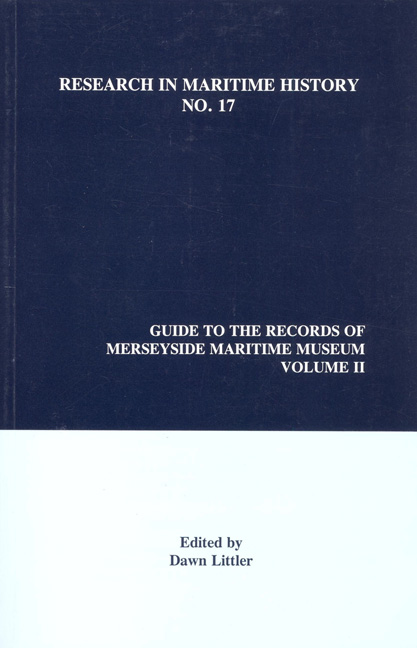Book contents
- Frontmatter
- Contents
- Introduction
- Notes on Access and Use of the Archives
- Acknowledgements
- Notes on the Editor
- List of Illustrations
- Chapter 1 Merchants, Ship Brokers and Agents, Stevedoring and Warehousing Companies
- Chapter 2 Transatlantic Slavery and Slave Trading
- Chapter 3 Emigration
- Chapter 4 Maritime Charities, Missions and Educational Establishments
- Chapter 5 Shipbuilding and Repairing, Engineering and other Maritime Trades
- Chapter 6 Maritime Families
- Chapter 7 Seafarers and Other Individuals
- Chapter 8 Special Collections: Titanic and Lusitania
- Chapter 9 Pictorial and Audio
- Chapter 10 Maritime Library
- Chapter 11 Research, Miscellaneous and Non-Maritime
- Chapter 12 Addenda to Guide, Volume I
- Index
Chapter 12 - Addenda to Guide, Volume I
- Frontmatter
- Contents
- Introduction
- Notes on Access and Use of the Archives
- Acknowledgements
- Notes on the Editor
- List of Illustrations
- Chapter 1 Merchants, Ship Brokers and Agents, Stevedoring and Warehousing Companies
- Chapter 2 Transatlantic Slavery and Slave Trading
- Chapter 3 Emigration
- Chapter 4 Maritime Charities, Missions and Educational Establishments
- Chapter 5 Shipbuilding and Repairing, Engineering and other Maritime Trades
- Chapter 6 Maritime Families
- Chapter 7 Seafarers and Other Individuals
- Chapter 8 Special Collections: Titanic and Lusitania
- Chapter 9 Pictorial and Audio
- Chapter 10 Maritime Library
- Chapter 11 Research, Miscellaneous and Non-Maritime
- Chapter 12 Addenda to Guide, Volume I
- Index
Summary
This final chapter describes collections which have been acquired since the publication of the first volume of this Guide in 1995, and which belong to sections of the collection already described in chapters two to four of that volume, the Official Organisations, Shipping and Trade Associations and Shipping Company collections. No guide can ever be taken to be exhaustive, least of all this one, for it is the very nature of archive collections that they grow and increase with the addition and discovery of further records. Recent additions to the Maritime Archives & Library have included the records of the Liverpool Shipping Staffs' Association, and London & Overseas Freighters Ltd., and also over a hundred volumes of Merchant Navy Radio Officers examination results. We have also taken the opportunity of including an enhanced entry for one of the shipping company collections, John Holt & Co. (Liverpool) Ltd., which has been the subject of further work since it was described in the first volume of this publication. Similarly, further cataloguing of the Mersey Docks & Harbour Board early miscellaneous documents has allowed us to revise that entry with new information.
New Acquisitions
Radio Officers Marconi Examination Results
The Wireless Telegraph & Signal Co., was formed in 1897 by Guglielmo Marconi, the pioneer of the system of radio telegraphy. Premises were acquired in Chelmsford, and in 1900 the company's name was changed to Marconi's Wireless Telegraph Co., and in 1963 changed to The Marconi Co. In 1900 Marconi International Marine Communication Co., Ltd. was formed with the sole purpose of working an exclusive licence for all maritime purposes. However, there was a problem with finding suitable staff as no colleges or schools existed which covered the subject of wireless, so in 1900 the company opened the world's first wireless school at Frinton. Under the Merchant Shipping (Wireless Telegraphy) Shipping Act of 1919, all persons operating radio telegraph apparatus on board ships registered in Britain, were required to hold either 1st or 2nd class certificates of proficiency issued by the Board of Trade's Wireless Telegraphy Service. The examinations for the certificates were taken at various technical colleges and wireless telegraphy schools across the British Isles and also at the Ship Inspection Depots at Liverpool, Cardiff and Newcastle.
- Type
- Chapter
- Information
- Guide to the Records of Merseyside Maritime Museum , pp. 217 - 224Publisher: Liverpool University PressPrint publication year: 1999

